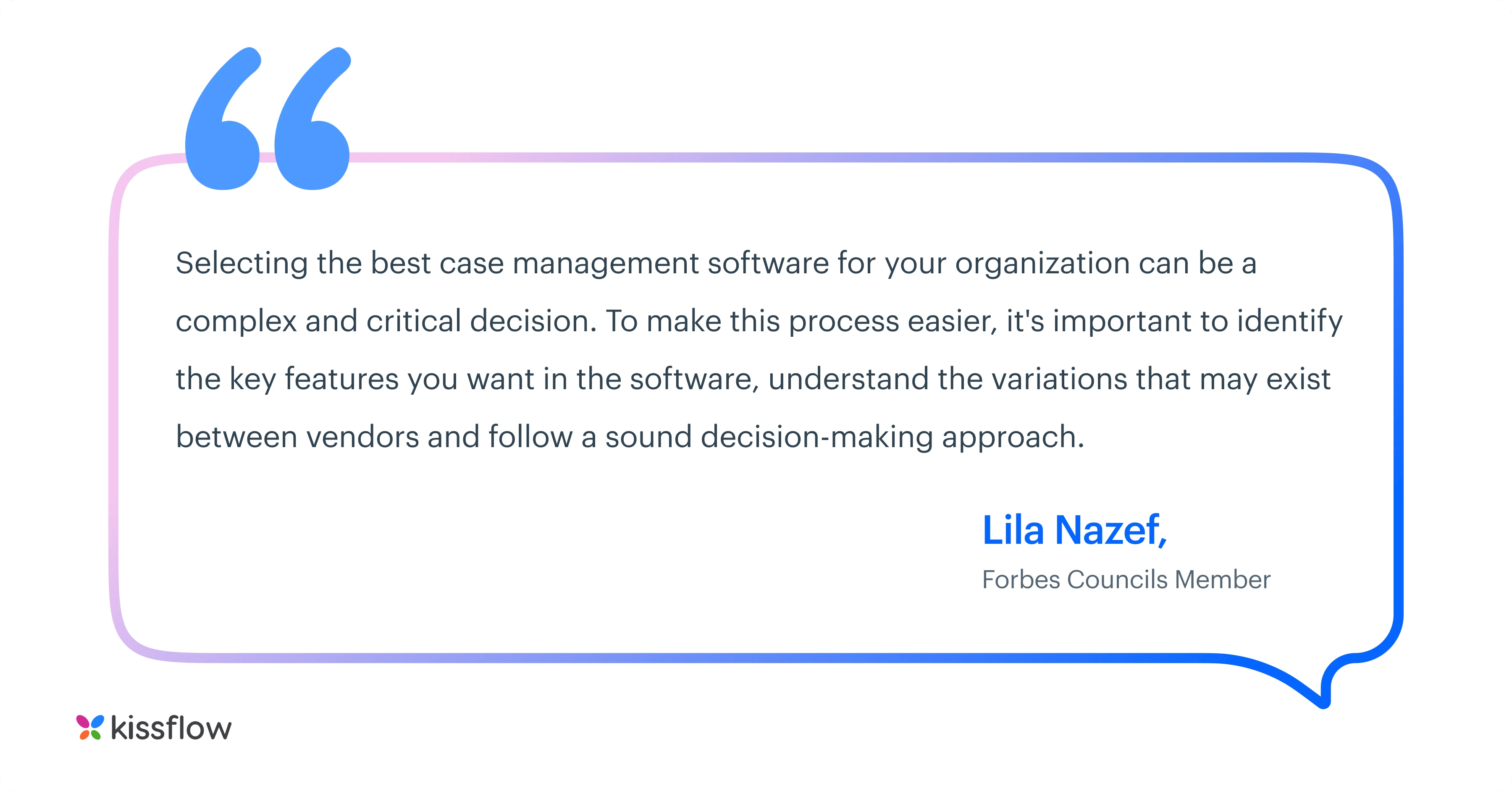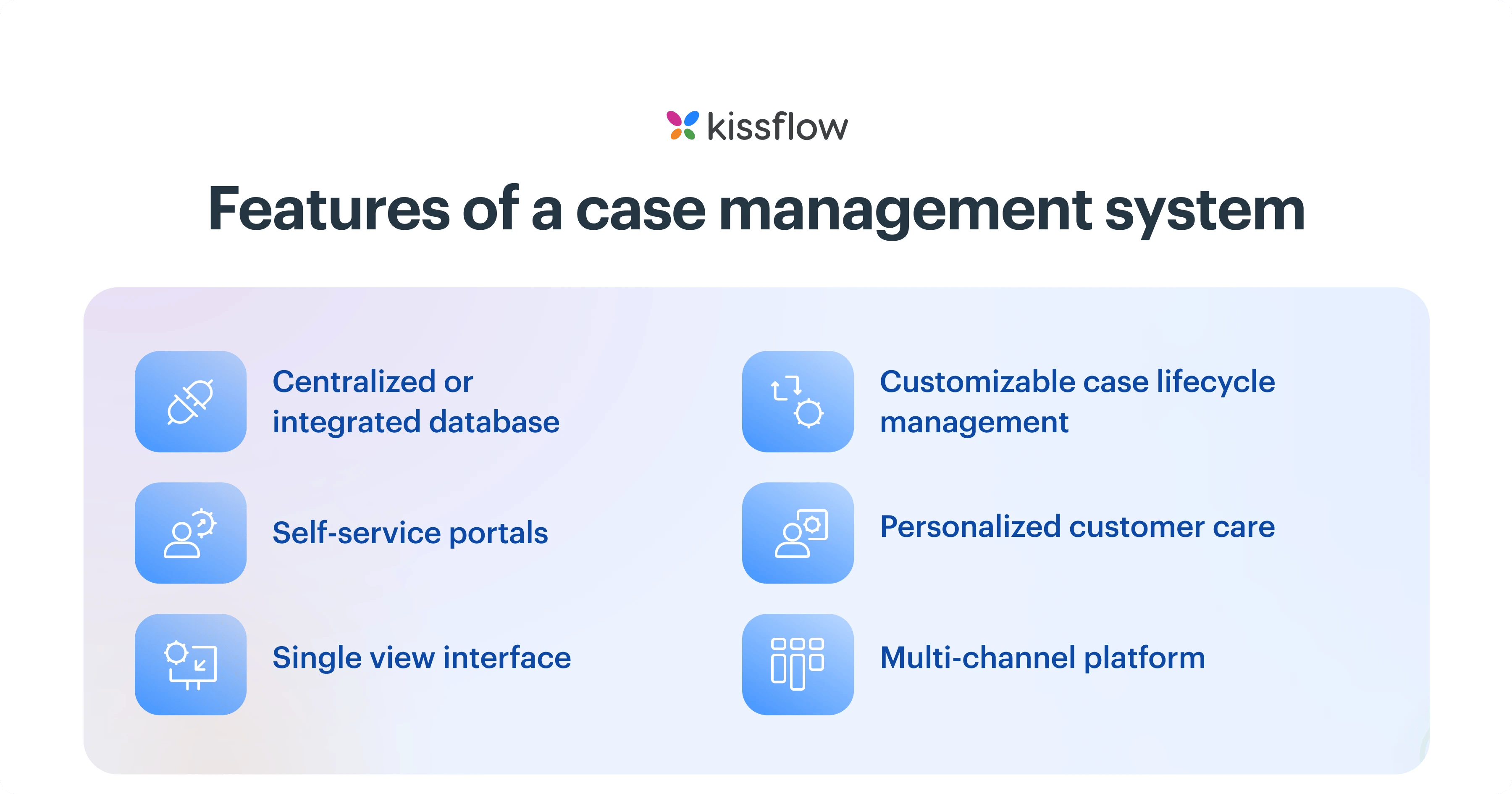For seamless enterprise operations, case management is an important component that includes management and coordination of all internal cases and processes. CIOs are readily prioritizing case management in their organizations to establish a structured approach for streamlining and automating routine tasks.
Efficient case management systems can improve decision-making and resource allocation while reducing the need for manual intervention.
What is the case management system?
Case management offers a dynamic structure for you to execute non-routine and unpredictable business processes that require complex decision-making and coordination of multiple tasks together.
Before highlighting its features and benefits, let’s go over the three main parts of a case management system:
1. Complex case
A case can be one of the many issues a business enterprise regularly handles. It could be an investigation of a complaint, a service request that should be fulfilled, or incident management that needs to be resolved. The steps involved in the resolution of this case are non-routine and unpredictable.
2. Electronic workflow
The workflow is a sequence of processes through which a case passes from initiation to completion. In an electronic case management system, the workflow is automated and streamlined to ensure prompt resolution of cases.
3. Human determination
Human determination is what sets a case management system apart from business process management. A case manager is crucial in deciding the best course of action in every step of finding the optimal solution to a case.
In a nutshell, case management is a collaborative process of finding optimal solutions for various complex cases through an electronic workflow and human determination.
What are the benefits of a case management system?
With a case management system, businesses can expedite the resolution of complex issues and ensure that optimal solutions are set in place. This is the primary advantage of case management, and it brings along with it several other benefits.
1. Digital record-keeping decreases paperwork
Case management tools allow for better record keeping because all case-related content and collaborations are stored in a cloud-based data storage system. Since all information is organized and managed in a single dashboard, knowledge workers don’t have to deal with confusing spreadsheets. Paper-based work is also considerably reduced, with most of the data gathered and stored in the cloud database.
2. Centralized data management allows for remote access
With businesses being more global today, remote access to business systems has become essential. All data can be securely accessed by authorized knowledge workers wherever they are–even if that’s on the other side of the globe.
3. Real-time updates and quick access to information
With integrated cloud-based data storage systems, any update in a case is reflected instantly across all channels. This same system provides quick access to information relevant to a case. Furthermore, knowledge workers can access this information anytime and anywhere they are using any platform available. It also allows them to work on a case all at the same time which, in turn, leads to faster resolution of the case.
4. Efficient resolution of cases through effective collaboration
A case management system facilitates seamless team collaboration. All members of the team involved in the resolution of the case can easily access information and communicate with each other through a single interface. This increases employee productivity and work efficiency. This smooth collaboration enables the team to come up with the best possible solution for a case.
5. Increased transparency and clear audit trails
Digital record-keeping increases transparency in all processes. The case manager can monitor each step in the process and the knowledge workers involved in the collaborations. Risks can be identified, and problem areas can be addressed easily.
This transparency also expedites the reporting process. Audit trails make it easy to analyze trends that can affect business productivity. They also allow easy retrieval of metrics and analytics that can be used to optimize the resolution of future cases.
6. Improved and personalized customer care
Through case management systems, customers are given a more personalized experience. They can opt to use the self-service portals to resolve issues on their own. They can also choose to talk to customer service representatives who can help them through the process. Since all information can be easily accessed, customer service reps can quickly pull out customers’ profiles to connect with them and assure them that the company understands their specific needs.

Features of a case management system

Since case management systems can be used in various industries, the features in each case vary depending on its purpose.
However, there are standard features that we see in almost all systems. Among them are:
1. Centralized or integrated database
A case management data system utilizes cloud databases that can be easily accessed by authorized persons. This allows for easy sharing of data and quick access to information regardless of where the customers and knowledge workers are located. Updates are reflected in real-time so cases can be properly assessed at any point in time.
2. Customizable case lifecycle management
Each business enterprise has unique needs. A case management information system can be customized to suit the requirements of any business. Logical rules in the automated workflow are set in advance to adapt to the specific need of a company. Customized form templates are also used to create, store, and manage cases in real-time.
3. Single view interface
A single view interface allows for a 360-degree view of a solution. This provides more efficient team collaboration and a more effective resolution of cases. With the use of dashboards, the need to switch tabs or software is eliminated. Furthermore, cases can be easily monitored, and reports can be analyzed immediately. Every aspect of the case can be assessed with ease.
4. Multi-channel platform
A global case management system is compatible with multiple devices. Data can be recorded, and information can be accessed through mobile phones, tablets, or computers on Android, iOS, and Windows platforms. Even with the variety of mediums, all data are synchronized instantly in the central database.
5. Self-service portals
Self-service portals empower customers by enabling them to immediately resolve issues on their own. These portals usually include useful articles, an FAQs page, a community page, or a forum. These portals are indispensable features of customer support.
6. Personalized customer care
Most case management systems allow knowledge workers to interact with customers on their preferred channel. Those channels can be through email, phone, messaging apps, or live chat software.
Customer profiles can also be immediately accessed along with all relevant information and past interactions. When customer care representatives have all this information at their fingertips, they can make customers feel valued.
Conclusion
Having a global case management system makes good business sense. It addresses changing customer demands, increases the efficiency of knowledge workers, and ultimately optimizes business processes essential for business growth.
Kissflow is a low-code platform that offers dynamic case management features, putting users in full control of their workflows, no matter how unpredictable or complex. From service requests to incident management, claim processing, ticketing, and bug tracking, Kissflow helps streamline and automate processes to make case management a breeze. Its visual drag-and-drop editor and pre-built templates allow business users with little to no technical knowledge to build workflows on their own, with no help from IT.
Once you’ve streamlined your business processes, your quality of service will improve, customer satisfaction will be greater, and business profit will soar. Solve your workflow challenges with Kissflow Platform and optimize your team's productivity.
















